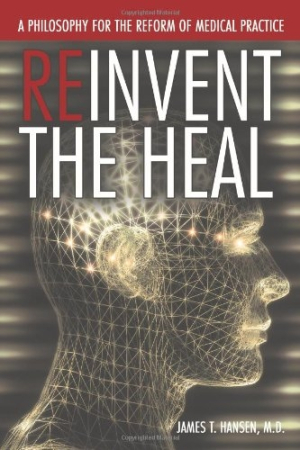Reinvent the Heal
A Philosophy for the Reform of Medical Practice
Giving the health care system a thorough checkup, James T. Hansen diagnoses modern medicine with a critical loss of human connection, leading to poor outcomes for patients and physicians alike. In his memoir, Reinvent the Heal: A Philosophy for the Reform of Medical Practice, Hansen mines his years of medical experience to bring to light the forces driving the disruption of the doctor-patient relationship, and the opportunities for restoring it.
A physician for over forty years, Hansen has seen medicine from all sides. He’s been a high-powered surgeon and an overworked resident. He’s been chief-of-staff at a large hospital and a patient in the waiting room. In all of these situations, Hansen noticed that something crucial was missing. Where was the intimate doctor-patient communication he remembered from his childhood hospital visits? How had the patient ceased to be treated as a person and instead become a commodity?
Hansen writes eloquently about the colleagues and cases that helped him answer these questions. For instance, he illustrates the growing emphasis on profit through a general surgeon’s frustration with his supporting role in the operating room, serving the haughty “technospecialist” whose expertise draws lucrative cases to the hospital. Similarly, Hansen notes the undue influence of pharmaceutical companies, as evidenced by their popular “drug day” seminars, hosted regularly by Hansen’s own training hospital.
Hansen is clearly disgusted by the growing financial focus, but he doesn’t pretend to be above the fray and does not shy away from revealing his own part in avoidable surgical mistakes, unnecessary invasive procedures, and the general disregard for patients’ wishes. He readily admits to being seduced into a specialty field himself when managed care systems became popular, diminishing doctors’ pay. As a gastroenterologist, Hansen got paid well for his skill with certain technologies and procedures, and became less and less involved with the patients themselves, to his own dismay.
Scientific jargon creeps into Hansen’s writing throughout the book, and some readers may be put off by medical descriptions of “neurological sequelae” and “hyperalimentation.” Most often, though, the doctor’s voice is delightfully direct and full of unexpected details. When he secretly calls one of his early teachers “horseface” or confesses that he has always hated laboratory rats, he engagingly reveals his human side.
Hansen ultimately gave up for-profit medicine and established a free clinic, where he began to re-establish his relationships with patients. He doesn’t expect modern medicine to follow in his nonprofit footsteps, but he does believe the interpersonal, spiritual side of medicine needs to be healed. Although Hansen’s proffered solutions are not as detailed as his criticisms, he hopes that his story will inspire future generations of physicians to take up his cause.
Reviewed by
Sheila M. Trask
Disclosure: This article is not an endorsement, but a review. The publisher of this book provided free copies of the book and paid a small fee to have their book reviewed by a professional reviewer. Foreword Reviews and Clarion Reviews make no guarantee that the publisher will receive a positive review. Foreword Magazine, Inc. is disclosing this in accordance with the Federal Trade Commission’s 16 CFR, Part 255.

